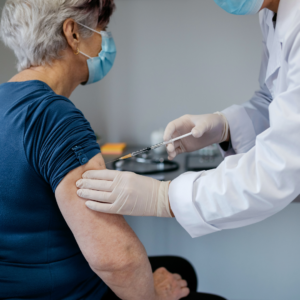What Seniors Need to Know About the COVID-19 Vaccines
2020 was hard for many of us because of the impacts of the worldwide pandemic, COVID-19 (Coronavirus 19). However, seniors were hit the hardest when it came to contracting this infection. According to the Center of Disease Control and Prevention, compared to younger adults, adults between the ages of 50 and 65 years old are four times more likely to require hospitalization and 30 times more likely to pass away from COVID-19. However, now with COVID-19 vaccines available, we are hoping to see a change in that statistic.
What Seniors Need to Know About the Covid-19 Vaccines
Researchers around the globe have worked tirelessly to develop a solution to combat the spread of the Coronavirus. Less than a year later, the Food and Drug Administration (FDA) has authorized two vaccines that are now being distributed to health care workers, staff, and residents of long-term care facilities in the United States. Because the vaccine is still fairly new, older adults may still have questions about this vaccine.
What vaccines are available and how are they administered?

The FDA has authorized two vaccines, Pfizer-BioNTech and Moderna, under its emergency use authorization. Both vaccines require two separate doses to be properly administered to ensure full effectiveness. Pfizer’s vaccine is approximately 95% effective against COVID-19 regardless of age, race, or other risks, and Moderna’s proved to be 94.5% effective against COVID-19 in people of all ages, genders, and ethnicities.
While the Pfizer-BioNTech vaccine requires you to wait 21 days before receiving your second dose, the Moderna vaccine requires you to wait 28 days until you can receive the second dose. Both vaccines are administered through an injection in the arm.
What are the side effects?
As more people will continue to receive the vaccine, the more researchers will learn about any long-term side effects. Currently, short-term side effects may include effects similar to those of a flu vaccine: soreness in the injection site, fever, chills, or headache.
How much will the vaccine cost?
According to the CDC, vaccine doses purchased with the U.S. taxpayer dollars will be given to the American people at no cost. Medicare, Medicaid, and private insurers will cover the cost of administration. At most, health care providers may charge an office visit fee but there will be no out-of-pocket costs for the vaccine itself.
When will I be able to get it?
As previously mentioned, frontline workers, staff, and long-term facility residents are the first persons to receive the vaccine. Each state has its plan for vaccine prioritization, distribution. And allocation. For information regarding Florida vaccine updates and where you can go for administration, Florida Health online.
At 24/7 Nursing Care, we are doing our part to prevent any possible spread of the Coronavirus. Our in-home referral nurses go through an extensive process to ensure they are safe, healthy, and COVID-19 negative. We undergo background checks and follow all CDC protocols to protect you and your family.
For more information on 24/7 Nursing Care and for a free in-home consultation, call our Miami-Dade office at (786) 518-3662 or our Broward office at (954) 949-1332.



